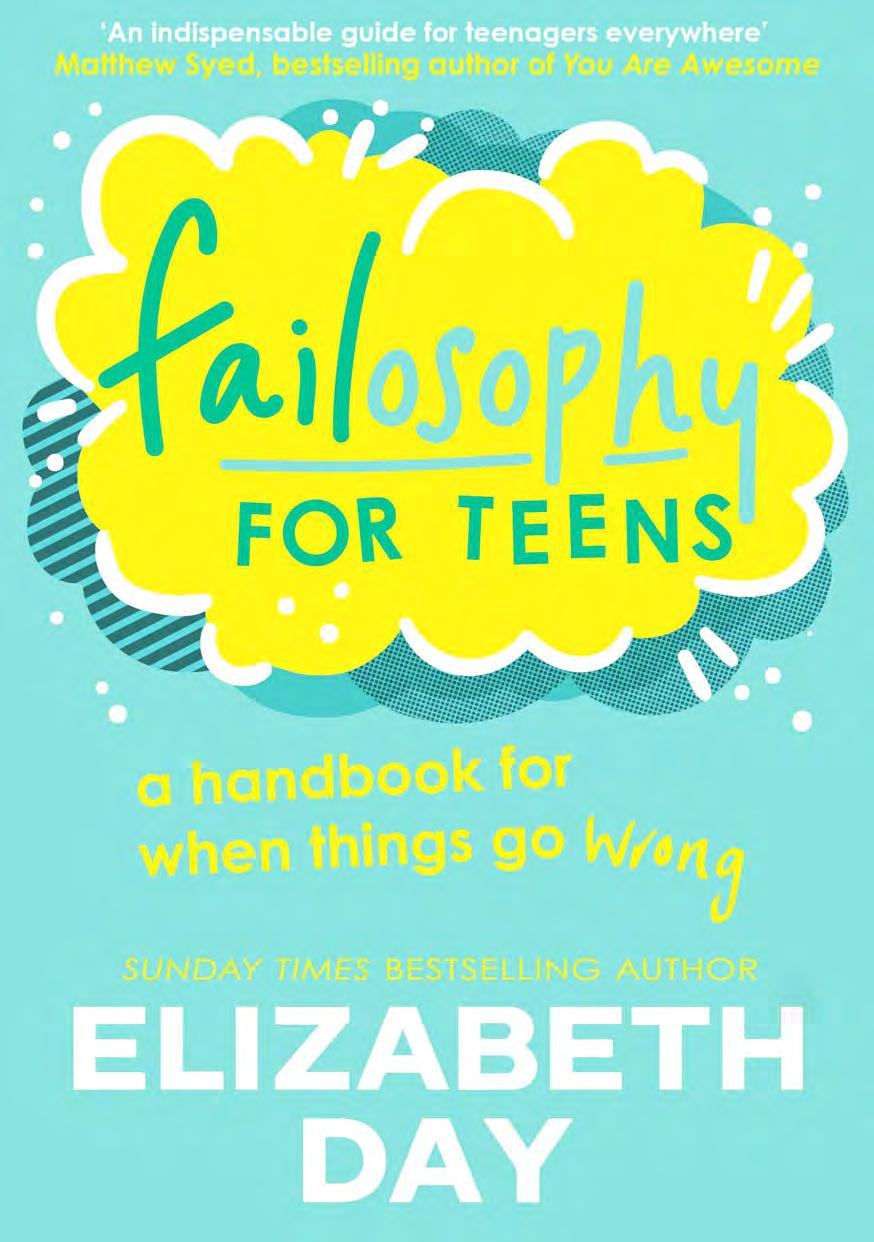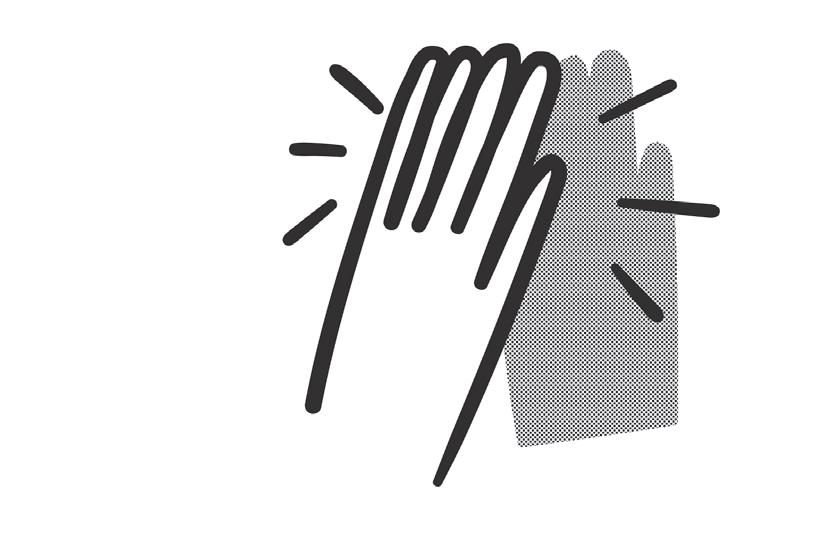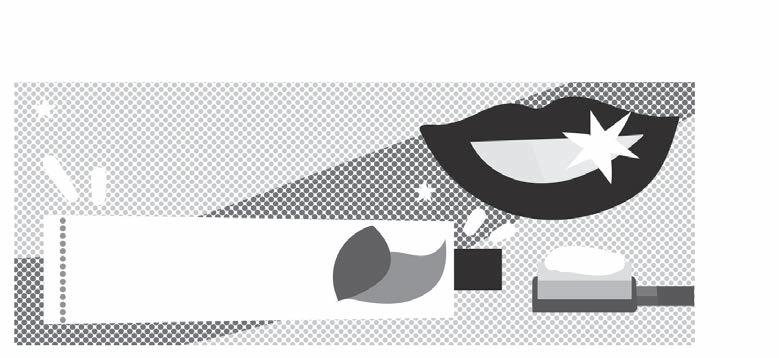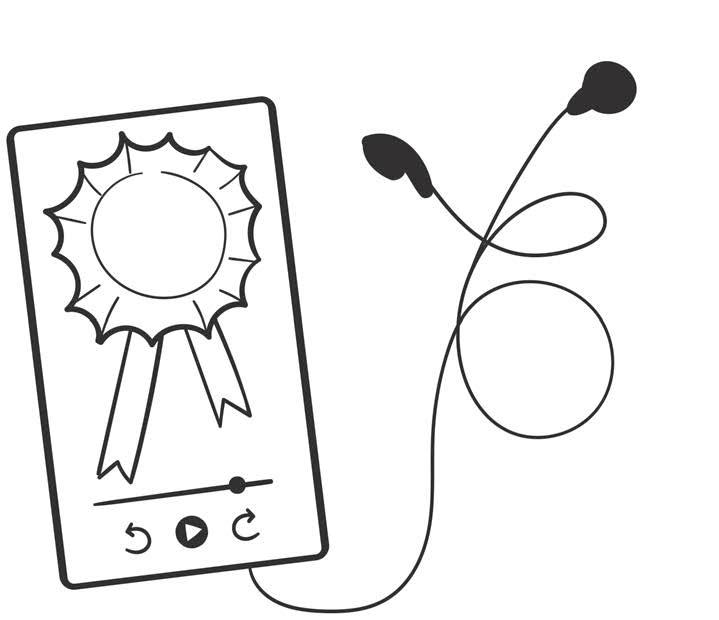



First published in Great Britain 2023 by Red Shed, part of Farshore
An imprint of HarperCollinsPublishers 1 London Bridge Street London SE1 9GF www.farshore.co.uk
HarperCollinsPublishers Macken House, 39/40 Mayor Street Upper, Dublin 1 D01 C9W8
Text copyright © Elizabeth Day 2023 Elizabeth Day has asserted her moral rights.


Text adapted from Failosophy with extra content. Extract from Matt Haig’s The Midnight Library (Canongate) on p12 used with the kind permission of the publisher and author. Extract from Holly Willoughby’s Reflections (Century) on p56 and p66 used with the kind permission of the publisher and author.

Illustrations copyright © HarperCollinsPublishers 2023 Illustrations by Kim Hankinson. ISBN 978 0 0085 8261 6
Printed and bound in the UK using 100% Renewable Electricity at CPI Group (UK) Ltd. 001

Consultancy by Dr Miquela Walsh, DEdPsych, MsC (Dist), BSc (Hons), HCPC accredited.
A CIP catalogue record for this book is available from the British Library. All rights reserved. No part of this publication may be reproduced, stored in a retrieval system, or transmitted, in any form or by any means, electronic, mechanical, photocopying, recording or otherwise, without the prior permission of the publisher and copyright owner. Stay safe online. Any website addresses listed in this book are correct at the time of going to print. However, Farshore is not responsible for content hosted by third parties. Please be aware that online content can be subject to change and websites can contain content that is unsuitable for children. We advise that all children are supervised when using the internet.
To every single young person who has, at some point, not felt GOOD ENOUGH
– this book is for you. E.D.
A Handbook For When Things Go Wrong





Principle 1: Failure just is
Principle 2: You are not your worst thoughts
Principle 3: Everyone feels like they’ve failed 59


Principle 4: Rejection is survivable
Principle 5: How to be a failure scientist 79
Principle 6: There’s no such thing as a future you 91
Principle 7: Being honest makes you stronger
Contents
Introduction 9
The Seven Principles of Failure:
21
41
71
What Happens When Life Sends You a Curveball? 109 Does Failosophy Actually Work? 119 What Does Failure Teach You About Success? 123 A Celebration of Failures 133
99


Introduction
What is failure? Great question! It was one that I avoided answering for a while, because it seemed like such a hard thing to explain. But eventually the definition I came up with was that failure is what happens when something doesn’t go according to your plan.
Reality
A A B


Plan B
Failure happens to us all, even those celebrities who appear like shimmering modern idols on the red carpet and who seem to have everything sorted.

9
PERFECT YOU! whiteningtoothpaste
Every day, we are bombarded with success stories to such an extent that we are in danger of believing that being exceptional is the norm. We live in an age of perfection, where we are led to think that we deserve success and will be rewarded with it if only we are clever enough or thin enough or sociable enough or, in some way, good enough. And online culture and social media have scared us into believing that any failure will be made public and everyone will soon know about it.
Your definition of failure depends on how you perceive success, but – here’s the good bit – you can reframe what success means to you. Perhaps success could mean trying your best when playing football or hockey, rather than being the one to score all the goals? Or perhaps success could mean being nice to your brother or sister, rather than owning a pair of expensive new trainers? Or being happy that you are unique rather than changing yourself to fit in with a group? For me, the truest form of success is about how you feel inside yourself. If you’re comfortable with who you are and how you treat other people, that’s the best kind of success.

10
If we don’t live our best lives for ourselves, we start to judge ourselves through other people’s eyes, becoming people-pleasers. This means acting in a way that we hope will make others approve of us – whether they’re total strangers, or our own family or friends – even when this goes against our own wants or desires.
As a teenager , I failed to see that my desire to people-please was making me unhappy. When I made friends, I used to think it was more important to be the kind of person they wanted me to be, rather than just being myself. I spent a lot of time trying to conform and doing things I wasn’t comfortable with because I wanted to be liked. But of course, no one stands a chance of liking the real you unless you are brave enough to show who that really is.

11
‘You don’t have to BE the best, just TRY your best’ – MABEL, POP STAR
People-pleasing sounds like it’s a nice quality, but it can be quite destructive to our personal growth. By constantly yearning for the approval of others and avoiding so-called ‘failures’, we miss out on the fulfilment that com es from being happy and confident in our own skin.
TO BE
– MATT HAIG
AUTHOR
When I was four, my family and I moved to Northern Ireland. It was – and still is – a part of the United Kingdom, but not everyone there wanted to be part of the UK. When we went over in 1982, there was a civil conflict. We used to drive through a military checkpoint on our way to school every morning. Bombs went off frequently. It could be a scary place.
As someone with an English accent, I didn’t fit in. In some environments, I was mistrusted because people assumed my family must be working for the British military, who were seen as enemy occupiers by those who wanted a united Ireland. (We were actually nothing to do with the army: my father was a surgeon).
12
‘If you AIM to be something you are not, you will always fail. AIM
YOU ’
At secondar y school in Belfast, I was teased for my accent and I found it difficult to make friends. I felt very lonely and sad. My grades spiralled. I became quieter and quieter. Eventually, I told my parents how unhappy I was and I changed to a new school that suited me much better. Although that was a difficult thing to go through, I understand now that it has made me who I am.
I failed to fit in at my first secondary school. But there were benefits to that: I became an observer and a listener, which have proved invaluable skills in my later career as a writer and interviewer. It gave me empathy for anyone who is or has been bullied, and it made me understand the value of kindness. It taught me how important it is to make real friends who accepted me as I am.
It also made me realise that no matter who you are, there are some people who will always make assumptions about you that aren’t true. But you have no control over that. Other people’s opinions are mostly to do with how they feel about themselves , not about you. They might be unhappy or angry or have a difficult home life and they’re lashing out. You are not in control of their opinions, but you are in control of your response to them . Don’t waste your energy trying to change their minds. Instead, use that same energy to make a new friend or to spend more time doing the things you enjoy. Get to know yourself. And remember: when you go through tough times, it makes the good times feel even better because you have something to compare them to.
13
‘THE DARKER THE NIGHT,’
Dostoyevsky wrote, ‘THE BRIGHTER THE STARS.’
I have spent a large portion of the last couple of years thinking about my failures. The weird thing is that thinking as an adult about my failures hasn’t been a negative experience. On the contrary, I feel stronger, happier and more empowered as a result. When I use the word ‘empowered’ what I mean is that I can claim my own courage rather than relying on anyone else’s. Imagine you are a phone. When you use a phone too much without charging it, the phone runs out of power and you can’t text your friends any more which is really annoying. But now imagine that you are your own phone charger: an in-built battery pack that means you never run out of power. That’s what I mean by feeling empowered. I have my own battery pack. I don’t have to rely on anyone else to build me up. Failures can’t hurt me as much because I know how to cope with them – even better, every time I learn from a failure, I build up my own battery life.
I’m no longer embarrassed by my failures because when I look back at them, I now feel proud of my resilience in surviving them.

14
For me, resilience is being able to recover or adapt when things go wrong, or when things change in ways I don’t expect. Being at peace with failure in this way means I don’t have too many regrets. I’ve accepted that we can’t always understand why things happen at the time they’re happening. But I do believe that life will generally teach us the lessons we need to learn if we are open to the possibility. This acceptance of failure helps me to be resilient and adapt when things don’t go to plan.
I wish I’d embraced my failures when I was younger, rather than feeling bad about them. How different my teenage years could have been! My hope is to help you see failure as part of the bigger picture and understand that . . .
And I wish I had been more open when things went wrong. I wish I had talked and discussed my failures. In my 30s, I was dumped by a boyfriend. I felt heartbroken and embarrassed. But when I confided in my friends about the experience, I actually felt closer to them. Being vulnerable is an amazing way to connect with others because the chances are, they will have gone through something similar but might never have had the opportunity to talk about it. I realised that conversations about failure were far more revealing than any other kind. When you talk about what’s gone wrong in your life, you allow other people the space to be honest about their own mistakes too.

15
although your failures make you who you are, they do not define you.
I then started to think about having these conversations more widely, so that more people could feel less alone. That was the idea behind my How To Fail podcast, which launched in July 2018. Each week, I ask my guest to come up with three ‘failures’ in advance of the recording. These can be sublime or ridiculous; profound or superficial. The only criteria are that the guest must feel comfortable talking about the subjects they’ve chosen, and that they are able to reflect on what they have learned from them.

My guests have ranged from footballers, psychotherapists, politicians, pop stars, chefs and former reality TV contestants. They have given insights into everything from failed exams and romantic break-ups to how to cope with severe anxiety. You’ll hear some of their hugely inspiring stories in this book, along with lessons I’ve learned from my own life.

how to fail
16
I have condensed the valuable experiences from my podcast and life learnings into seven key areas, intended as helpful guides through life’s rough patches. Consider them the equivalent of having a chat with a good friend who wants to make you feel better.

1. Failure just is
2.You are not your worst thoughts
3. Everyone feels like they’ve failed

4.Rejection is survivable
5.How to be a failure scientist
6. There ’s no such thing as a future you
7. Being honest makes you stronger
As Albert Einstein said, ‘Failure is success in progress.’ However difficult something might seem at the time, it is always possible to learn something. Try to believe that something good will come from a failure. Sometimes, you might not be able to make out what that positive is straight away. Sometimes, you can only know that with hindsight, but being optimistic could give you the energy or courage to do the things that make you anxious or worried.
17
I’m not saying it’s easy. I know it takes a lot more effort than just talking to yourself in the mirror or collecting quotes from Instagram. Our mental muscles require just as much working out as our physical ones. Try out the challenges throughout the book to discover more about you and how to live your best life.
Some failures are far more traumatic than others and it might take more time before you feel better about what’s happened. If you feel emotional pain – sadness, upset, embarrassment, anger – that pain is a fact, whatever the cause of it.

But there is a difference between pain and suffering. Pain, like failure, happens to us all. We accidentally burn our tongue on a cup of hot chocolate that is too hot. There is the immediate pain, which hopefully subsides quite quickly. Then there is the subsequent suffering, which lasts a bit longer as we struggle to taste food for a few days. But imagine being hard on yourself about the fact that you’d been stupid enough to burn your tongue for several weeks and months afterwards. That would be prolonging suffering unnecessarily.


18
Instead, you could say to yourself: ‘Well, I burned my tongue, but at least I’ll know for the next time to add a bit of cool milk to my hot chocolate before I drink it.’


Thinking positively when things go wrong will prove incredibly powerful on many levels. And instead of trying to avoid failure we can think instead about how mistakes actually help us learn and grow.

And that’s what this book is all about.
So, read it all in one go, or dip in and out. Either way, I hope it might help you to realise that failure does not have to be alienating. In truth, it is the opposite: it connects us all. Failure makes us human.
19
That, in a nutshell, is FAILOSOPHY.






















